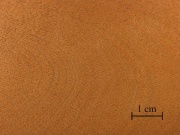Difference between revisions of "Imbuya"
Jump to navigation
Jump to search
(username removed) |
(username removed) |
||
| Line 19: | Line 19: | ||
== Authority == | == Authority == | ||
| − | * | + | * G.S.Brady, ''Materials Handbook'', McGraw-Hill Book Co., New York, 1971 Comment: p. 856 |
| − | * | + | * Ralph Mayer, ''A Dictionary of Art Terms and Techniques'', Harper and Row Publishers, New York, 1969 (also 1945 printing) |
[[Category:Materials database]] | [[Category:Materials database]] | ||
Revision as of 06:28, 24 July 2013
Description
A dark, greenish-brown wood from the tree Nectandra villosa, native to Brazil. The color and texture of the wood is similar to true walnut and thus it has been called Brazilian walnut. Imbuya is an important wood for carving, furniture, cabinets and flooring. Several other species of Nectandra trees also grow in the tropical region, many of which have similar characteristics.
Synonyms and Related Terms
Nectandra villosa; embuya; imbuia; Brazilian walnut
Additional Images
Authority
- G.S.Brady, Materials Handbook, McGraw-Hill Book Co., New York, 1971 Comment: p. 856
- Ralph Mayer, A Dictionary of Art Terms and Techniques, Harper and Row Publishers, New York, 1969 (also 1945 printing)

